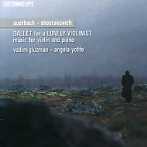The angst, the tortured emotion, the relentless grinding dissonance, and dare I say it, the noise! Shostakovich’s violin sonata has to be one of the ugliest works ever written for violin and piano and there’s no getting around the fact that you have to be “in the mood” or you’ll never get through its gritty, hard hitting 30-plus minutes. If you are in the mood, you couldn’t do better than this rendition by Vadim Gluzman and his pianist partner Angela Yoffe, who’ve proven their mettle as a team in similarly challenging repertoire (type Q6722 in Search Reviews) and who truly understand and exploit Shostakovich’s edgy, urgent, agitated style and pungent, pointy sound-world to the extent that after the final morendo violin passage you may just need to sit in total silence for awhile.
Wisely, the pair chose to program the same composer’s jaunty, light, and very stylish Jazz Suite No. 1, in a 2005 transcription by the violinist’s father, immediately following the Sonata, and the pair milk the Waltz, Polka, and Foxtrot for all they’re worth, with Gluzman especially playful and spirited with the expressive bowing effects.
Lera Auerbach’s Lonely Suite for solo violin, which is dedicated to Gluzman, tells somewhat of a story based on the “themes of loneliness and fragmentation”. Each of its six brief sections identifies and in some violinistic way expresses a mood or condition or situation, from “Boredom” and “No Escape” to “Worrisome Thought” and “Question”, the latter turning out to be unanswered. Auerbach uses the violin in the most basic ways, focusing on simple effects rather than flashy virtuosic display or sophisticated melodic material. For example, “Dancing with Oneself” is a kind of pseudo-duet articulated using both bow and pizzicato; “Worrisome Thought” employs col legno alternated with a single-note melody; “Boredom” sounds like a double-stop etude.
We’re back to the agitated, discordant late-Shostakovian world of the disc’s opening work with Auerbach’s Sonata No. 2 (Ah, the sul ponticello!)–and its subtitle, “September 11”, makes its timbral, textural, and thematic context perfectly clear. It’s both angry and meditative, but mostly angry, and here the composer’s avid stylistic regard for Shostakovich is evident everywhere–the chromaticism, the driving rhythmic sequences, the craggy melodies. And speaking of melodies, she manages to briefly incorporate a segment of “America the Beautiful” into the piece, sadly, pathetically spoken by the violin all alone. A mournful, searching solo follows, and when the piano enters once more it’s really a marvelous moment where the keyboard figures and textures perfectly meld into the violin’s moody utterance.
This is really a very fine piece, expertly written for these two instruments, and although I’m very wary of any works that tag onto the 9/11 tragedy either as an obligatory or crassly commercial endeavor, this definitely isn’t one of those. It’s very good music, regardless of its composer’s motivation (she began writing it on September 12), and Gluzman and Yoffe’s performance should convince other artists to consider adding it to their own repertoire. The sound is absolutely first-rate. All I can say is, if you’re ready for this, don’t hesitate!
































